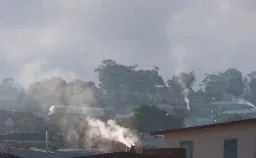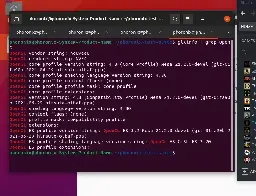I like how easy Shiori is to install and the UI is much more responsive than Wallabag (could be a config/install issue) but it does have some annoyances too:
- No mobile app (I think there is an abandoned third party client though)
- Session expires frequently in the Firefox extension, requiring frequently going into extension settings
- No koreader support for e-readers etc
But it is actively developed and it's the most promising alternative to Wallabag in my view.
Premier Chris Minns claims climate activists such as Blockade Australia are endangering lives by streaming protest actions

Civil liberties advocates have lashed the New South Wales Labor government’s attempts to stop climate activists from livestreaming protests on Facebook.
Members of Blockade Australia staged and streamed protests across the country this week, including along a train line that services the Newcastle coal port.
The premier, Chris Minns, announced via the Daily Telegraph on Thursday that he would request a meeting with the social media giant, alongside police, to see what they can do to “stop the broadcast of illegal acts”.
“Their business model relies on social media to broadcast their protest,” he said of the Blockade Australia protesters.
“These thrill demonstrators are putting lives at risk – both their own and those of emergency service and police.
“I don’t want to see a situation where there’s a death broadcast on social media.”
The opposition supported the idea, with leader and former attorney general, Mark Speakman, saying it would help deprive the protesters of attention.
“We all have a right to protest, but other people have rights as well … all those rights have to be balanced,” he said.
But independent crossbench MP Alex Greenwich said it was a “deeply concerning” development, noting the importance of protest in democracies.
“I strongly oppose those protest laws that were rushed through the parliament last year. Freedom to protest is such a fundamental right that we really need to be protecting,” he said.
The chair of Digital Rights Watch, Lizzie O’Shea, said the comments were something that she would “expect to hear from the People’s Republic of China, not from a Labor NSW premier.
“People use live streaming for very important accountability scenarios or for accountability measures, including, for example, filming violence by police all around the world. And the idea that live streaming should be prohibited when it comes to protest is profoundly anti-democratic,” she said.
O’Shea said it wasn’t clear how it could be implemented technically, or how Meta would be able to distinguish between what protests are allowed to be streamed and what would not be allowed.
Guardian Australia understands the premier has yet to formally approach Meta to discuss the idea, and had not communicated directly with the tech giant about the plan since the announcement.
The president of the NSW Council for Civil Liberties, Josh Pallas, accused the premier of attempting to shut down freedom of speech and freedom of expression.
“Trying to shut down protesters’ use of Facebook is yet another example of the way that freedom of public assembly in NSW is being attacked by successive governments,” he said.
He said interference from governments in the way protesters used Facebook would set a “precedent where private enterprises are called on to acquiesce to the will of the government of the day in stifling speech”.
The previous government introduced new laws to deal with protesters that could see them slapped with $22,000 fines or put behind bars for two years for types of protest that included disrupting or obstructing traffic on a major bridge, tunnel or road.
Minns supported the laws when in opposition.
Human Rights Watch researcher Sophie McNeill said peaceful protest was an important human right.
“You don’t respond to the climate emergency by trying to censor people protesting about it!” she said on social media.
One day we will look back in amazement that we once tolerated wood heaters in our cities. We’ll regard them in much the same way we do polluting factories today.

Imagine a fleet of ageing factories operating in neighbourhoods across Australia.
On most days the smoke from their stacks is hardly noticed. But on cold days when the smog settles in the densely populated valleys and towns, doctors notice unusually high numbers of people suffering from a range of problems, especially asthma.
Air-quality researchers are called in to study the problem in more detail. They confirm that neighbourhoods with these old factories have higher concentrations of fine particles, which are toxic air pollutants.
Invisible to the naked eye, particles are inhaled deep into the lungs, enter the bloodstream and cause a range of harms throughout the body. This air pollution is linked to higher rates of heart and lung diseases, strokes, dementia and some cancers. It also increases the risk of adverse pregnancy outcomes and poorer learning outcomes in children.
The researchers calculate that each year pollution from the factories causes 269 premature deaths in Sydney, 69 in Tasmania and 14 in Armidale, New South Wales.
While the factories are supposed to be built, maintained and operated to certain standards, the regulations are rarely if ever enforced. There isn’t even a central register to tell authorities how many of these factories exist, how old they are, and where they are located.
As news of this research is made public, how would the affected communities react? What might they demand of government?
Would it matter if they knew we were not talking about factories, but wood heaters? Heaters produce much of our air pollution
Every sentence of this story is true if you replace the word “factory” with “wood heater”.
Less than 10% of households own a wood heater, but burning wood for heating is the largest source of air pollution in many Australian cities and towns. While vehicle manufacturers and industry have greatly reduced emissions following tightened government regulations, domestic heating technology has not kept pace.
Today you would have to drive a diesel truck 500 kilometres to emit as much air pollution as a wood heater does in a single day. And that figure is for a wood heater that meets the current regulatory standards in Australia. Most do not.
Furthermore, wood heater pollution can be many times more severe when owners leave logs to smoulder overnight, burn poorly seasoned wood, or close down the air intake immediately after loading more wood.
Of course, particulate pollution is not all that wood heaters emit. When firewood is sourced from land clearing and illegal wood hooking, wood heaters add to net carbon dioxide and methane emissions in much the same as burning coal does because the carbon is no longer locked away in forests.
The best estimates are that less than a quarter of firewood is sourced from sustainable plantation suppliers. Even from those sources, the carbon emissions take many years to be sequestered into growing trees.
One study estimated that, if we stopped burning wood and clearing forest for heating, Australia would reduce its annual greenhouse gas emissions by 8.7 million tonnes. That’s about one-fifth of Australia’s car emissions. The benefits of electrification
Inevitably, as Australia moves towards a zero-carbon future, the electrification of domestic heating will bring widespread health and economic benefits. It will prevent hundreds of premature deaths each year.
Hospitals will benefit from a reprieve in the cooler months, enabling doctors and nurses to better cope with seasonal pneumonia and COVID-19 outbreaks. And even those outbreaks will be less severe with reduced air pollution.
Besides being healthier, Australians will enjoy much lower heating costs as a result of using technologies such as reverse-cycle air conditioners (heat pumps). Remarkably, heat pumps are up to 600% efficient. That means, for every unit of energy they consume, they generate up to six units of heating energy. Making the switch
As people learn about the impacts of wood heaters on their neighbours, friends and relatives — on pregnant women, young children and the elderly — many will make the switch.
Governments need to ensure safe and affordable heating technology is available to everyone regardless of their income.
Already, governments in the Australian Capital Territory, Tasmania and New Zealand have programs that reimburse households for the cost of replacing their wood heaters.
Buy-back schemes, home efficiency subsidies, regulation and enforcement, including property market regulation (ensuring wood heaters are removed prior to sale), and restrictions on new installations all have a role to play.
We are conducting economic modelling to determine the most cost-effective policy settings for maximising the benefits of policies to manage the problem of wood heaters.
Fire and smoke will remain important experiences for Australians. They can be savoured primarily outside the city, under bright stars, in open deserts and rugged coastlines, in beach shacks and farm cottages, and as part of Indigenous cultural practices.
One day we will look back in amazement that we once tolerated wood heaters in our cities, right next to schools, homes and hospitals. We’ll regard them in much the same way that we think of polluting factories today.
Bill Dodd, Knowledge Broker, Centre for Safe Air (NHMRC CRE), University of Tasmania; Bin Jalaludin, Conjoint Professor, School of Population Health, UNSW Sydney, and Fay Johnston, Professor, Menzies Institute for Medical Research, University of Tasmania
It's the power usage and physical space that puts me off those kind of solutions. Of course, that varies a lot based on your living circumstances (location, whether you own a house, etc).
For the first time since 1984, the world's top three Test batters - according to the ICC player ratings - are from the same country

Personally I use Snapcast as an endpoint, plain MPD for local files, and navidrome for remote access to my library.
That's where I've been heading too. The snapcast client has been a bit unreliable for me on my desktop though (choppy and stuttering) but it's great in its unix-like flexibility and I'm sure it will continue to get better.
Honestly, I hope that mobile connections in my country are one day: fast enough, cheap enough, and reliable enough that I could just use snapcast remotely and get truly seamless self-hosted streaming but that's still a long way away I suspect.
Linux 6.3 triggers a use-after-free inside #nouveau with the consequence of corruption kernel memory.
I check PCGW more prominently these days because even if the original game works, you can expect there to be some quirks that exist on Windows as well that Proton accurately replicates.
Fast bowler who played so well in 2019 is not fully fit and may miss out in the first Ashes Test because of Scott Boland’s form

Not so much a quote I say out loud, but I often think of the scene where Lurr is buying human horn:
I'm just some guy... RULER OF THE PLANET OMICRON PERSEI 8.
